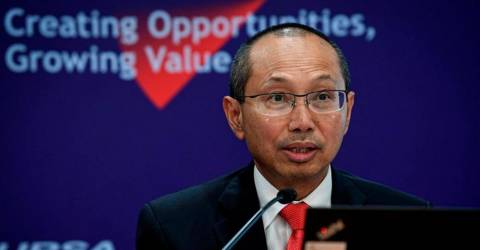KUALA LUMPUR: Bursa Malaysia Bhd chairman Tan Sri Abdul Wahid Omar wants local financial institutions to list their Islamic banking subsidiaries on its exchange to add more shariah- compliant equity instruments to the market.
He said there is a lack of shariah-compliant equity instruments in the financial services sector.
Abdul Wahid said well-known local banks are categorised as conventional, despite “a big portion of the businesses are now shariah compliant”.
Citing Malayan Banking Bhd as an example, he said more than 60% of its total financing in Malaysia is shariah compliant.
“We would like to encourage these banks to list their Islamic banking subsidiary … (and for) market players to think ‘How can we have more shariah-compliant equity instruments in the financial services sector?’ That’s a collective effort for everyone in the sector,” he told reporters at the Invest Shariah Conference 2023 organised by CGS-CIMB Securities Sdn Bhd here today.
On challenges, Abdul Wahid noted that many of the banks operate on a leverage model, whereby their Islamic banking business is leveraging on their branch network, which includes their management team.
Moreover, when a bank lists separately, it has to consider its minority shareholders and may encounter issues of related party transactions.
“That’s why we have to start thinking about the possibility of other instruments, which will enable a portion of the equities to be traded on the shariah-compliant side, that’s something that we have to talk about.
“(There is a) need to think about designating some of the shares as shariah-compliant shares (through) ringfencing and earmarking … income from the Islamic banking operations as a source for payment of the dividends,” he opined.
In terms of outlook, Abdul Wahid expects the general Islamic market to be more positive in the second half of the year as global interest rates reach their the peak during the period and anticipates the reversal of investment flows away from developed markets into emerging markets.
“That will mean that there will be more investments coming to the emerging markets, not just in Malaysia but also other Asean countries, such as Thailand, Indonesia. That will help support the market and when they come into the market, it will bolster not just the shariah-compliant equities but also the broader market interaction,” he said.
Meanwhile, investor development head Stephanie Tan remarked that there is still space to improve the range and depth of shariah-compliant financial instruments to meet investors’ demand.
Tan explained that in order to meet the demands of the evolving market landscape, the need for modernisation becomes apparent as “emerging asset classes, financial instruments and investment strategies present opportunities to thrive in this evolving environment”.
“Embracing a broader array of financial instruments – such as sukuk, Islamic ETFs and Islamic REITs – expands our access to diversified investment opportunities, enhances liquidity and accommodates varying risk profiles.
“For instance, 81.9% of the total market cap on Bursa is shariah compliant as of June 2023. At the same time, the total market cap for the five Islamic REITs made up 43% of the 19 REITs listed on the exchange while there are six i-ETFs, making up 18.9% of the NAV of the 20 Exchange Traded Funds listed on Bursa,” she said.
In addition, Tan opined that the future for shariah investments “appears exceedingly promising”, due to the emergence and significance of shariah-compliant technological solutions.
The conference, ‘Navigating the Shariah Horizon: Diversifying Investment Frontiers,’ which was organised by CGS-CIMB Securities Sdn Bhd, targets to create awareness and explore interesting topics and ideas relating to shariah-compliant products and services, as well as the Islamic capital market.
